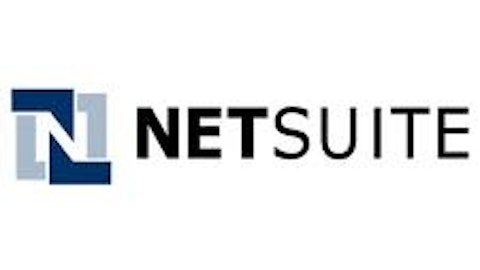
That being said, Oracle’s performance in the stock market hasn’t been remarkable in the past several quarters. Oracle is essentially a debt free company, with $33.7 billion of cash and short-term investments against only $18.5 billion of debt. This results to approximately $15 billion of surplus cash, or $3 per share.
I feel that Oracle’s stock is preparing itself for a mild uptrend in 2013. In this article, while I focus on the positive catalysts for the stock, I also address the near-term concerns for the company.
Oracle: The big brother in cloud computing
Oracle Corporation (NASDAQ:ORCL)’s cloud solutions serve large corporations who rely on its products to run critical business operations. Providing reliability, security and privacy are Oracle’s top priorities for its clients. Oracle’s Software-as-a-Service (SaaS) for large corporations are very capable of addressing such primary concerns.
Since Oracle’s products have very high switching costs, as I mentioned above, migrating away from the company requires extensive planning and testing, including running both Oracle and new systems in parallel for an extended period of time. I feel this is a huge competitive advantage for Oracle.
Oracle’s large customer base
Oracle has 390,000 customers around the globe, and serves all of the top Fortune 100 companies. Such an economic moat is built on its wide SaaS model, and Oracle is expanding it through both R&D and acquisitions.
But now Oracle is facing serious problems in serving cloud SaaS, and a majority of IT execs are already considering leaving Oracle. However, the battle has just begun and Oracle is massively updating its software and revamping its SaaS business model to retain customers.
ERP: Oracle, SAP (NYSE:SAP) and the upstarts
The old battle between Oracle and SAP has become a stalemate, as new rivals in the form of upstart Enterprise Resource Planning (ERP) cloud vendors, such as NetSuite and Workday, are emerging. While newer ERP companies’ revenues remain much smaller than those of SAP and Oracle, they are growing at much faster percentage rates.
SAP is repositioning its main Business Suite for large enterprises as an on-premises core ERP system, while offering add-on SaaS applications as well as the Business ByDesign suite for midsized companies and divisions of larger ones. Oracle, meanwhile, has highlighted the cloud deployment option for its new Fusion applications while emphasizing that customers can take an incremental approach to adopting Fusion.
Salesforce.com (NYSE:CRM) venturing into ERP?
Customer Relationship Management (CRM) giant Salesforce.com recently introduced an employee performance management application called Work.com. The company has left more central ERP functionality up to partners such as Workday. Salesforce.com has also made an investment in Infor, which is mostly known for its on-premises ERP software but has been moving quickly to the cloud.
At roughly $3 billion in revenue, Infor is the industry’s largest ERP vendor after SAP and Oracle. While there’s no indication that Salesforce.com wants to turn its investment into a full-blown purchase of Infor, such a development would create a third ERP mega-vendor. While it’s still not clear if Salesforce.com is making any big leap into ERP in the near-term, it wouldn’t be wise to rule out the possibility of the CRM giant’s entry in core ERP.
The Bottom Line
In the last six months, SAP strongly outperformed Oracle in the stock market. From a valuation standpoint, it appears that Oracle is much undervalued in comparison to SAP. One reason why Oracle is so much cheaper may be the fear factor that Oracle could acquire a large systems company at any time. But I feel such fear is overrated, and Oracle’s compelling fundamentals will boost its stock price in the near-term.
The article This Enterprise Cloud Player Offers Decent Value originally appeared on Fool.com.
Copyright © 1995 – 2013 The Motley Fool, LLC. All rights reserved. The Motley Fool has a disclosure policy.





